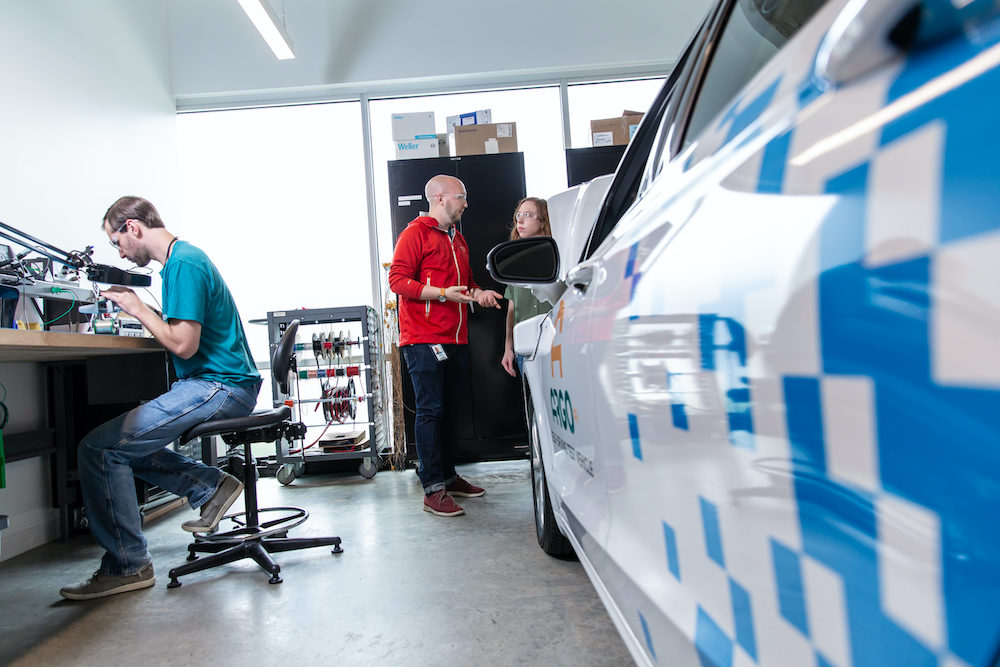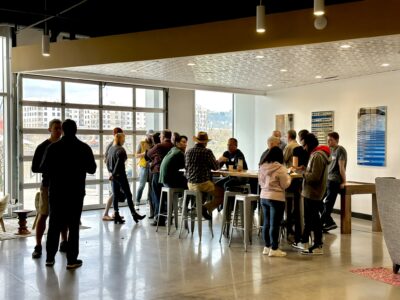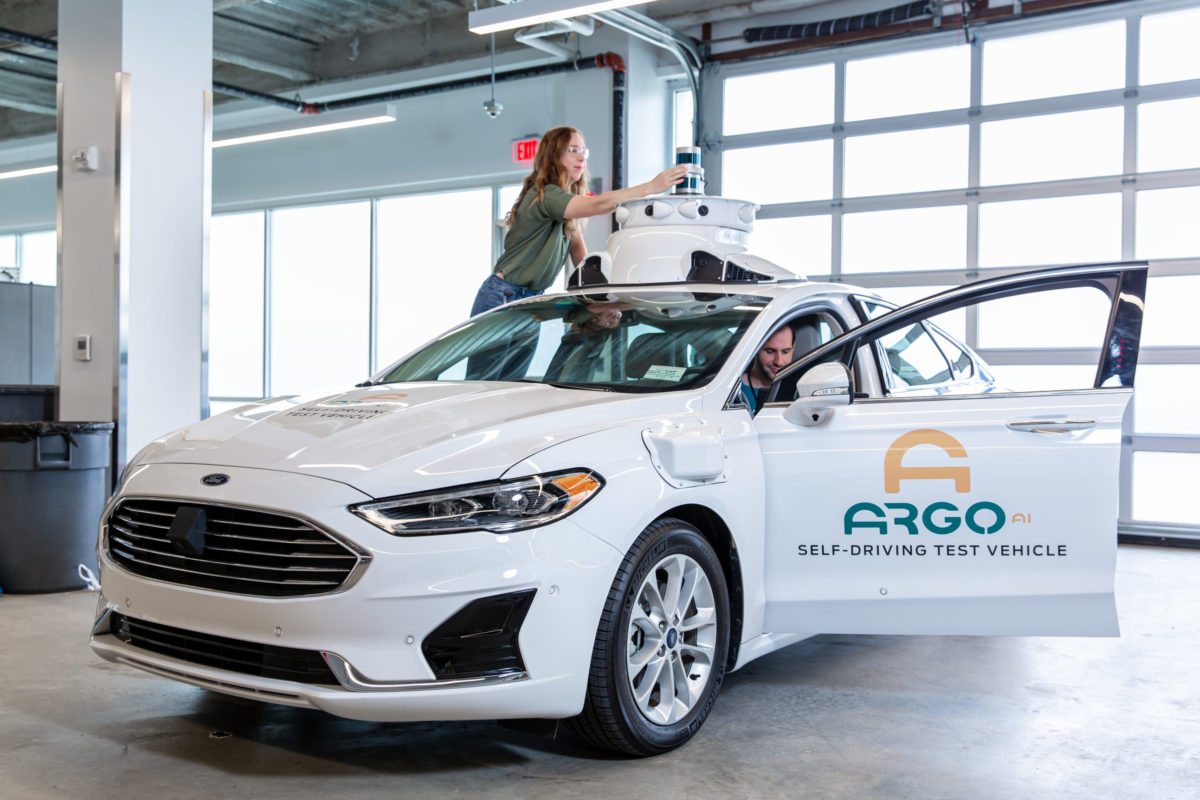But one earnings report and all-team meeting later, the Strip District-based autonomous vehicle tech company is being absorbed by Ford and VW, two of its biggest investors.
On Wednesday, news spread that Ford decided to place its efforts in developing driver’s assistance systems instead of autonomous vehicles technology. That decision was made alongside a third-quarter earnings report from Ford that showed a $2.7 billion non-cash pre-tax impairment on the Argo investment, which led to a $827 million loss in the third quarter.
The announcement also comes a few months after Argo laid off about 150 staffers this past July. As of early this week, the company counted about 2,000 employees, including 800 in the Pittsburgh region.
From those employees to stakeholders in the tech community, the news was a shock to many. This was, after all, a company that was expected to go public some time this year. Technical.ly asked Steel City’s tech leaders: What does Argo AI shutting down mean for the future of Pittsburgh tech?
‘Dynamic’ growth amid risk
An overarching feeling about Argo AI’s demise is sadness, several said, especially for the affected employees. Yet most tech leaders remain hopeful about the future of self-driving cars in the community and the robotics industry in the city as a whole.
Just how big is that industry? More than 100 companies and over 40 supporting organizations are working within the robotics and autonomous systems industries in Pittsburgh, and the companies based here are responsible for over 7,000 jobs directly in robotics and autonomous systems, according to the Pittsburgh Robotics Network’s recent Pittsburgh Robotics Cluster Profile report.
Robotics Network Executive Director Joel Reed said in an email to Technical.ly that he considered Argo AI to be a “pioneer” and “leader” in the world of mobility. Although the news represents a setback, Reed expects that Pittsburgh will stay at the forefront of innovation in the world of self-driving technology.
“Our region’s robotics ecosystem has grown so dynamically, the region is capable of absorbing corrections such as these. This is the hallmark of a strong ecosystem cluster,” Reed wrote. “Pittsburgh is still leading the way in autonomous systems, and the talented employees at Argo that accepted the challenge to help solve extremely difficult problems for the good of everyone will continue to drive robotics, our region, and society forward in their future roles.”
For InnovatePGH President and CEO Sean Luther, the loss of Argo is a real setback, but that the autonomous vehicle sector still has a place in the region’s tech industry. Although this chain of events is unfortunate, Pittsburgh is equipped to cope, he said.
“Pittsburgh has a long history of economic resilience and our tech ecosystem is well-positioned to weather this transition,” Luther wrote in an email. “A tech-based economy strategy — like Pittsburgh’s — creates a high-risk, high-reward dynamic. Developing new technology is not easy and our region must expand its support of a diverse group of founders, work to increase new company starts, and build as broad an economic future as possible.”
Pittsburgh must be ready to absorb shocks like this with an economic development opportunity rooted in advanced tech. This is also a reminder of the need to aggressively increase support for a wide diversity of founders and improve our "shots on goal" with for new co formation
— Sean C. Luther (@SeanCLuther) October 26, 2022
Another perspective is that the most notable thing about Argo AI isn’t that it’s shutting down, but that the startup was willing to try to move the region forward with self-driving technology in the first place. That’s how Audrey Russo, president and CEO of the Pittsburgh Tech Council, sees things from where she’s standing.
“Companies come and go. I mean, that is the way the world,” she said. “The best thing that we can do is understand that when certain companies fail, it’s not a reflection of ourselves, it means that we have to stand back up and ask what we can do to support these companies?”
About those markets
It’s also important to remember the outlying factors behind Argo’s closing, Russo said, namely the economy and the fact that autonomous technology is an inherently difficult pursuit.
The tech these companies are building is being proven in real time. There’s no commercial product yet, and thus no chance for short-term profit. And with a looming recession and the cost of living rising, investors are rethinking how they want to spend their money. (Crunchbase recently quantified the public market’s “rapidly decelerating interest” in the AV industry. See Pittsburgh’s Aurora with a current valuation of $2.6 billion compared to a $14 billion valuation when it went public via SPAC in November 2021.)
As Sam Abuelsamid, the principal analyst for e-mobility at the Detroit-based marketing research firm Guidehouse Insights, told Technical.ly at the time of Argo’s summer layoffs: “Over the last several years, everybody has come to the realization that the problem of actually commercializing automated driving technology is actually a lot harder than they thought. And it’s taking longer. And nobody is able to scale this up. Nobody has even gotten to the point where they can generally apply this everywhere.”

Inside Argo AI’s Pittsburgh headquarters. (Courtesy photo)
Matthew Johnson-Roberson, director of the Carnegie Mellon University Robotics Institute, noted that the news reflects the realities of startups: Sometimes they fail. Indeed: Often they fail.
While Johnson-Roberson found job losses sad and hoped that some of Argo’s former employees can find new positions in the city, like Russo, he thinks it’s admirable that Argo was willing to try. The company’s platform included software, hardware and infrastructure it hoped would power self-driving vehicles.
He also noted that there are still entities willing to keep exploring what self-driving technology has to offer.
“I think Pittsburgh is capable of trying out big, audacious technical projects,” Johnson-Roberson said. “That’s what I think self-driving cars are. They’re a big, big swing in that Pittsburgh is a place where that opportunity exists, which I think is great. And I hope that we keep trying to track.”
Although the robotics director is hopeful about the future of Pittsburgh tech, Johnson-Roberson doesn’t think it’s solely in self-driving cars. As there are many different kinds of technologies being researched and developed within the city, he said, in the future there should be a “broad” investment in multiple areas.
“A lot of money flowed into self-driving technology very, very quickly and my hope is that we just see a more diversified investment structure moving forward,” Johnson-Roberson said. “People take a lot of different paths, because I think, yeah, it’s not clear if any of them are going to work out. And that’s sort of the nature of startups. So my hope is that people keep taking big swings, perhaps in more areas. I’m not certain that you’re going to see a ton more direct investment in self driving, at least not probably urban driving.”
What comes next
In the meantime, Argo’s employees must take their next steps. Ford and VW are reportedly considering hiring a number of them, but not all. Those who are let go will be given severance packages including bonuses and health insurance.
In public posts in LinkedIn, a handful of technologists, talent acquisition pros, researchers and data analysts from Argo have already shared that they’re searching for new positions.
“I have been through a lot of company restructuring and layoffs, but this is my first time being laid off myself, and gotta tell you it’s not the best feeling,” one former engineering manager for the company wrote on LinkedIn. And yet, “even with this end, I don’t regret going to Argo. This role was different than anything I had done, and used my skills nicely.”
Whether the tones were somber, sad or hopeful among Pittsburgh’s tech leaders, the consensus was that Argo shutting down is a loss for the region. But thanks to the recent passage of legislation loosening regulations for AV testing and the growing acceptance of the tech by the public, there’s also confidence that the Pittsburgh tech industry will continue to be a leader in the world of robotics and move forward.
“In spite of the news that Argo AI will cease operations in Pittsburgh, AV remains a viable part of the region’s robust robotics and autonomy ecosystem,” said Stefani Pashman, CEO of the Allegheny Conference on Community Development, in a statement. “Pittsburgh has always been bold about taking on challenges and committing to whatever it takes to turn those into opportunities. Our robotics ecosystem is resilient, and I’m confident in its future.”
Join the conversation!
Find news, events, jobs and people who share your interests on Technical.ly's open community Slack

Pittsburgh weekly roundup: Neighborhood newspaper for tech; Bartel honored at CIO awards; $204M for broadband internet

Revitalizing our coverage to connect Pittsburgh's tech and startup scene

This Week in Jobs: Don't sleep on these 23 tech career opportunities


